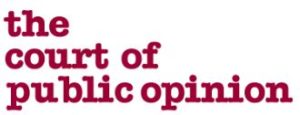


Corporate Attorneys & The Court of Public Opinion
[By Thom Fladung, Hennes Communications]
“The house could be burned down before you even smell smoke.”
In 2009, The Georgetown Journal of Legal Ethics set out to study how the court of public opinion can shape legal controversies. The sources were the people on the front lines – responses gathered from a questionnaire sent to all general counsels of S&P 500 corporations and 57 interviews conducted with some of those general counsels, law firm partners and public relations consultants.
The summary finding: “The intensified media scrutiny of the 24-hour news cycle is a growing concern for companies and their general counsels. The interviewees in the PR study often commented that the number of instantaneous media outlets with which to broadcast information create public interest in corporate legal events overnight. One participant in the PR study aptly observed: ‘The house could be burned down before you even smell smoke.”’
The summary conclusion: “…the court of public opinion acts as an extra-legal decision-maker and, therefore, influences the fair administration of justice. It contends, therefore, that managing legal PR is a legitimate and fundamental component of corporate legal service. Ultimately, in the last part, the article recommends that corporations and the profession should attempt to support and enhance corporate lawyers’ ability to manage this role effectively.”
You can read the entire study, by Michele DeStefano Beardslee, here
Naturally, at Hennes Communications, we would heartily agree. The court of public opinion is where we do much of our work.
Since 2009 and this study, the bar has been raised considerably by social media. The court of public opinion is always in session and that court today most frequently is held on Facebook and Twitter.
Consider, according to a 2016 Pew Institute study:
- 62 percent of U.S. adults get news on social media.
- 6-in-10 of Twitter’s 310 million monthly active users get news there.
- Two-thirds of Facebook’s 1.13 billion daily active users get news on the site.
That’s why we’ve broadened our fundamental guidelines for communicating in the court of public opinion. It’s still crucial to tell the truth, tell it all and tell it first. Now, we’ve added: tell it fast.
The people shaping public opinion on social media won’t wait for you to prepare an argument. They’ll plow on, continuing to circulate misinformation and downright falsehoods if you’re not actively monitoring and correcting. And more important than the person posting on social media are the people reading those posts – and wondering why you’re not responding.
To effectively use litigation communications in the social media era, you need to understand what channels are being used by your most important audiences, what people are saying about your issues, who the key social media influencers are who may be weighing in and how to use social media most effectively for your case or issue.
You can read more about our views on social media and litigation communications here.
As to how lawyers and crisis communicators can work together more effectively, click here.
Don’t let the house burn down before you smell the smoke.
Thom Fladung is vice president of Hennes Communications. Prior to that, he spent 33 years in newspapers, including stints as managing editor of The Plain Dealer and Detroit Free Press. Please contact Hennes Communications to learn more about the intersection of social media, the practice of law, crisis communications and more, including how to attend a Hennes presentation.